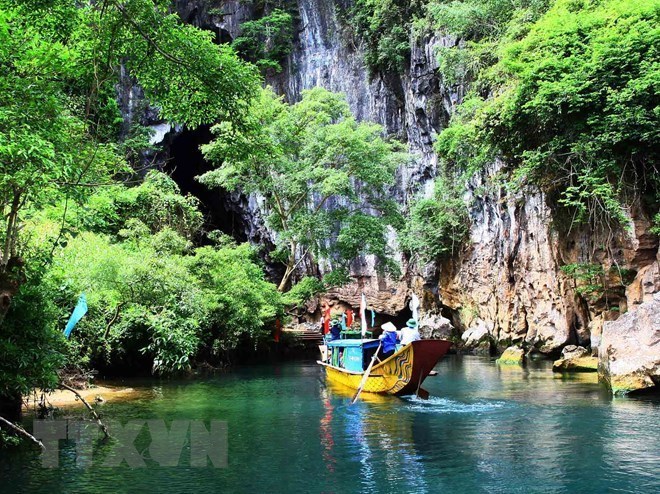



Sailing to the gate of "Hang Toi" (Dark Cave) in Phong
Nha-Ke Bang National Park in Quang Binh
(Photo: VNA)
A series of measures to boost tourism cooperation between the
province and the Mekong Delta region were discussed at a conference held in
Quang Binh’s Dong Hoi city on June 18.
Endowed with stunning natural landscapes like untouched white sandy beaches and
UNESCO World Heritage Site Phong Nha Ke Bang National Park, coupled with
excellent cuisine, Quang Binh province poses huge potential for tourism
development, said Vice Director of the provincial Department of Tourism Dang
Dong Ha.
Quang Binh has affirmed its tourism prestige as it welcomed 3.3 million
tourists in 2017 and the number is estimated at 1.8 million in the first six
months of the year, including 85,000 foreigners.
Appraised by international media and experts as one of the leading
worth-experiencing destinations in the world, Quang Binh is an attractive place
for tourism investors, Ha said, adding that the locality is channeling efforts
in promoting sustainable tourism development in companion with improving local
livelihoods.
Meanwhile, An Giang, Can Tho, Kien Giang, Bac Lieu, Ca Mau, Soc Trang and Hau
Giang in the Mekong Delta region are local tourism and socio-economic hubs.
Boasting with famous tourist attractions such as Cai Rang floating market, My
Khanh tourism village, Truc Lam Phuong Nam Zen Monastery, Binh Thuy ancient
house, Phu Quoc island and Son islet, the localities served nearly 22.5 million
tourists in 2017.
Therefore, enhancing tourism links between Quang Binh province and the Mekong
Delta localities is significant to create favourable conditions for tourism
businesses to expand their markets while making tourism as a spearhead economic
sector of the provinces.
Solutions to improving tourism products and services were on the table at the
event. Participants said that relevant parties should pay due attention to
improving tourism service quality, diversifying tourism products and
introducing new tourist attractions.
In addition, tourism businesses were advised to share experience and seek
cooperative opportunities.
On the occasion, a Memorandum of Understanding on tourism cooperation was inked
between Quang Binh province’s tourism department and the Departments of
Culture, Sports and Tourism of the Mekong Delta city and provinces.
Accordingly, they will work to improve efficiency of state management and
tourism promotion, and build mutual tourism products to attract more tourists.-
Source: VNA